Mormons Suspend Worship, Buddhists Livestream Services Over Coronavirus Fears
As businesses, sports leagues, colleges campuses and other institutions announced sweeping cancellations and updated guidelines to combat the spread of the coronavirus, American houses of worship are also coming to grips with the pandemic.
Because the virus can spread easily in crowded places, health officials and politicians around the country are urging Americans to practice “social distancing” ― avoiding large gatherings and maintaining a distance of 6 feet from others whenever possible.
This is a challenge for houses of worship since they are places where large groups of people gather, especially in times of uncertainty and suffering. COVID-19, the disease caused by the coronavirus, has proven to be especially deadly for the elderly — and older Americans are much more likely than younger generations to attend church weekly.
From suspending services to modifying key rituals, American congregations have had to make swift and often unprecedented changes to the way they practice faith. Here are some of the ways religious Americans are adapting to the outbreak:
Mormon Temples And Meetinghouses
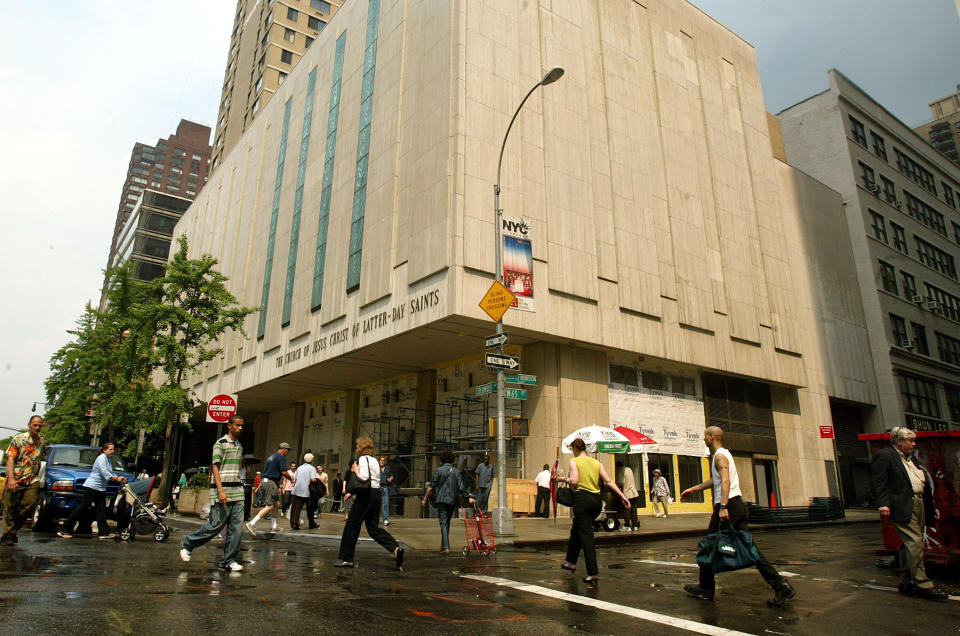
For the first time in more than 60 years, the Church of Jesus Christ of Latter-day Saints, widely known as the Mormon Church, will be holding a key global conference without any attendees.
The church’s General Conference typically draws about 100,000 people to its headquarters in Salt Lake City. This year, in April, top leaders, their spouses, musicians, choir members and technicians will be allowed to participate, but general members will be barred from attending. Instead, the church will be broadcasting the meeting on television and the internet, which is how hundreds of thousands of members typically watch the proceedings.
“We want to be good global citizens and do what we can to control this contagious illness,” the church’s top governing bodies said in a statement Wednesday.
The church also announced on Thursday that worship services worldwide, including Sunday sacrament meetings, are temporarily suspended. Church leaders are trying to make sure the sacrament, known in other churches as Holy Communion, is available to members in some way at least once a month.
The coronavirus outbreak has also prompted changes to the church’s mission work, which is considered a rite of passage for many young Mormons. Missionaries scheduled to enter the church’s flagship training center in Provo, Utah, will instead be “trained remotely by video conference.” Those sent to areas where COVID-19 is of particular concern ― countries such as Italy, Japan and South Korea ― are being directed to stay in their apartments as much as possible, avoid personal interactions with other people and instead proselytize through phone calls and other technological means.
In addition, the church has temporarily closed temples in New York City, Seattle, Boston and Louisville, Kentucky. Since religious wedding ceremonies, baptisms, and other key rituals can only take place in temples, the closures could have a significant impact on church members in these areas.
Jewish Synagogues
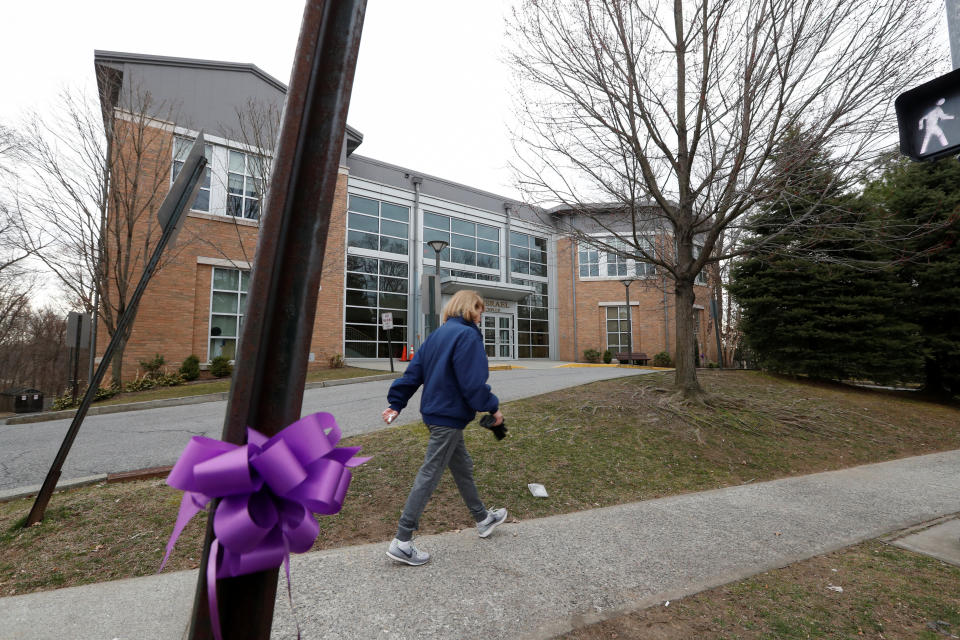
An Orthodox Jewish synagogue in Westchester County in the suburbs of New York City was one of the first U.S. houses of worship to face fallout from COVID-19 after one of its congregants contracted the illness. Many of the county’s 120-plus positive cases are connected in some way to the Young Israel of New Rochelle synagogue, including its rabbi. Westchester health officials have asked the synagogue to halt all services. On Tuesday, Gov. Andrew Cuomo created a “containment” zone where no large gatherings are permitted and with the synagogue at its center.
These developments have had a profound impact on the community. More than 100 of the synagogue’s families have self-quarantined. Bar and bat mitzvah ceremonies were canceled, as were celebrations for Purim, a festive Jewish holiday that began Monday. A group of Jewish students stopped by various houses in the neighborhood, reading the Book of Esther on front lawns to ensure that quarantined families fulfilled the obligation to hear the text read out loud on Purim.
Most Jewish communities maintain that for communal prayer to happen, there needs to be a minyan, a quorum of at least 10 people physically present. This has become a challenge in neighborhoods where public officials have put limits on gatherings.
At the Beth El Synagogue Center, a Conservative Jewish synagogue less than a mile away from Young Israel, members are being invited to join a neighboring synagogue’s minyan virtually through Zoom. The congregation is also developing a schedule of online lessons and other programming to ensure that people feel connected to the community.
“We will not let this public health crisis deter us from serving the needs of our congregation,” Beth El told its congregants in an email this week.
The three major American Jewish denominations ― Reform, Conservative and Orthodox ― have published guidelines on how members should practice Jewish rituals and fulfill religious obligations during the pandemic. The Rabbinical Assembly, which advises Conservative congregations, has suggested forgoing kissing Torah scrolls and other ritual objects during this time, while the Rabbinical Council of America, which counsels Orthodox congregations, published updated standards for ritual baths.
Amy Asin, the vice president of strengthening congregations for the Union for Reform Judaism, said the organization has created resources to help member congregations figure out how to livestream events for the first time.
“There is an opportunity for congregations to be present in people’s homes in ways that haven’t been necessary before,” Asin told HuffPost. “This is an opportunity to show the power of community, not the lack of it.”
Mosques
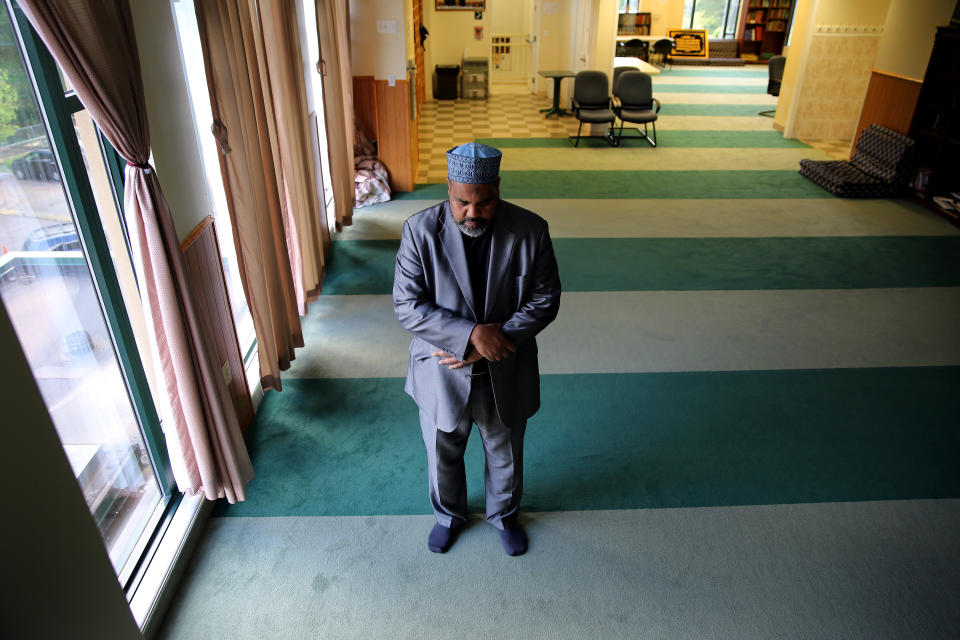
One of the key objectives of Islamic law is the preservation of life and prevention of harm, according to Imam Mohamed Hag Magid, the spiritual leader of All Dulles Area Muslim Society Center in Sterling, Virginia. That’s why he and other American imams have been reminding Muslims that it is their religious duty to protect their own health and the health of those around them.
Generally, attending Friday congregational prayers is a requirement. But if someone is exhibiting symptoms associated with anything contagious, such as a cold or flu, the obligation to prevent harm supersedes the requirement to be in congregation, Magid wrote in a letter shared by the Islamic Medical Association of North America.
“For those who are unwell and are seeking comfort in congregation, it is preferable to request someone to [pray] for you and to maintain spiritual upliftment through prayer at home, and listening to lectures online,” Magid wrote.
Magid also said Muslims should follow the directives of public health officials seeking to prevent harm and avoid “discriminating or stereotyping against any individuals as it may relate to the virus.”
After consulting with interfaith partners in the area, the ADAMS Center announced on Facebook Thursday evening that it was temporarily suspending congregational prayers and classes and would instead offer seminars online. The center also circulated guidelines for families with at least three people in their households to conduct Friday prayers in their own homes.
The Islamic Society of North America, the largest and oldest American Islamic umbrella group, has been organizing online educational seminars for Muslims concerned about COVID-19.
“As Muslims, we are told to be prepared, proactive, patient, and put our trust in Allah (SWT),” the society said in a statement. “Any calamity or wide spread disease reminds us of his power. It serves like a wake up call so that we can humble ourselves in his service.”
Sikh Gurdwaras
Love HuffPost? Become a founding member of HuffPost Plus today.
Worship services in Sikh gurdwaras are usually followed by langar, a free community meal offered to anyone who needs it. The meal is prepared by volunteers and eaten in a communal fashion, with large numbers of people sitting on the floor, often in close proximity to one another.
The practice is meant to promote charity and equality, but many gurdwaras are now taking extra steps to ensure the safety of langar volunteers and participants.
“Sikh ethos is about sharing and providing a place for gathering for the sick and vulnerable,” Gurpreet Padam, a board member at California’s Sikh Family Center, told HuffPost. “Balancing this with the guidelines around COVID-19 is, of course, difficult.”
Many gurdwaras are being more vigilant about sanitizing food preparation and eating areas, Padam added.
Staff and volunteers at the Hollywood Sikh Temple in California have been instructed to stay away from the temple if they develop any flu-like symptoms, Navdeep Singh Sachdeva, the temple’s public affairs director, said.
The temple’s chef and volunteers are being extra cautious about food preparation. Volunteers are also scrubbing down and disinfect floors, tables, chairs and food service counters at regular intervals, he said.
“There is more vigilance so that mistakes do not happen,” Sachdeva told HuffPost. “We have received extra supplies of cleaning materials and gloves.”
If the Los Angeles Unified School District announces school closures, the temple will likely follow suit, he added.
Hindu Temples
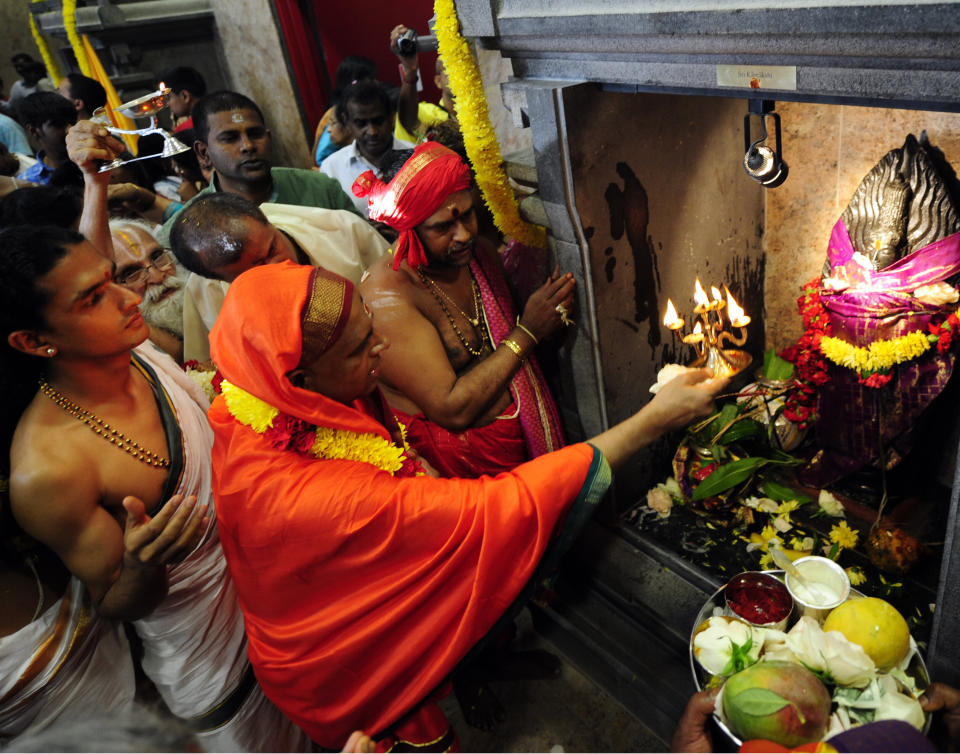
The Hindu Temple & Cultural Center in Bothell, Washington, has taken significant steps in light of the state’s ban large gatherings.
Some Hindu practices ― Samuhika pooja, Abhishekams and Parayana, for example ― require participation from a large number of people who may need to be in close proximity to each other for an extended period of time. The coronavirus has made these services difficult to carry out, temple spokesperson Mani Vadari told HuffPost, and there are also other essential rituals that, according to Vedic principles, need to be performed every day.
Temple leaders have decided that any rituals requiring participation from devotees will no longer be conducted. Devotees will no longer be able to perform darshan, or reverential viewing, of deities in the mornings. In addition, food and prasadam ― food that is offered to and sanctified by deities ― won’t be distributed in the temple.
Instead, priests will perform services alone on behalf of the devotees. Priests will also be the only ones at the temple handling kumkum and vibhuti, the sacred powder and ash applied to devotees’ bodies. Devotees only have one hour in the evening to access the temple, and office managers will be periodically monitoring the number of people in the temple.
“Priests will make announcements requesting devotees to maintain safe space between them and to avoid rushing or crowding in the temple,” Vadari said.
On the opposite side of the country, scheduled prayers were taking place as usual on Thursday at the the Hindu Temple Society of North America in Queens, New York. But Uma Mysorekar, the temple’s president, said some weddings and cultural events that were supposed to be held at its adjacent community center have been postponed.
The temple is making sure that all staff are free from colds, coughs and other upper respiratory illnesses, and “also making sure that extra attention is paid to cleansing and sanitizing the place,” Mysorekar told HuffPost.
Buddhist Temples
The New York Buddhist Church has decided to suspend all church-sponsored group activities at its facility until March 31. The decision was made after “careful consideration and recognizing that many of our regular attendees and visitors are elderly and may be particularly vulnerable to COVID-19,” Rev. Earl Ikeda told HuffPost.
The Seattle Buddhist Temple has also canceled services and all temple-led programs until the end of March. Instead, the community’s services will be livestreamed on its YouTube page.
In a March 8 livestream, Rev. Irene Goto said this is likely the first time many of the congregants are attending service via the internet. She said it was an opportunity for the congregation to deepen their meditations, express gratitude to the Buddha at their home shrines and develop compassion for others.
“I think this interruption gives us an opportunity as human beings, as a sangha, to work together as one to stem a threat to the whole community’s health and well-being, regardless of our individual, ego-centered attachments,” Goto said.
Catholic Churches
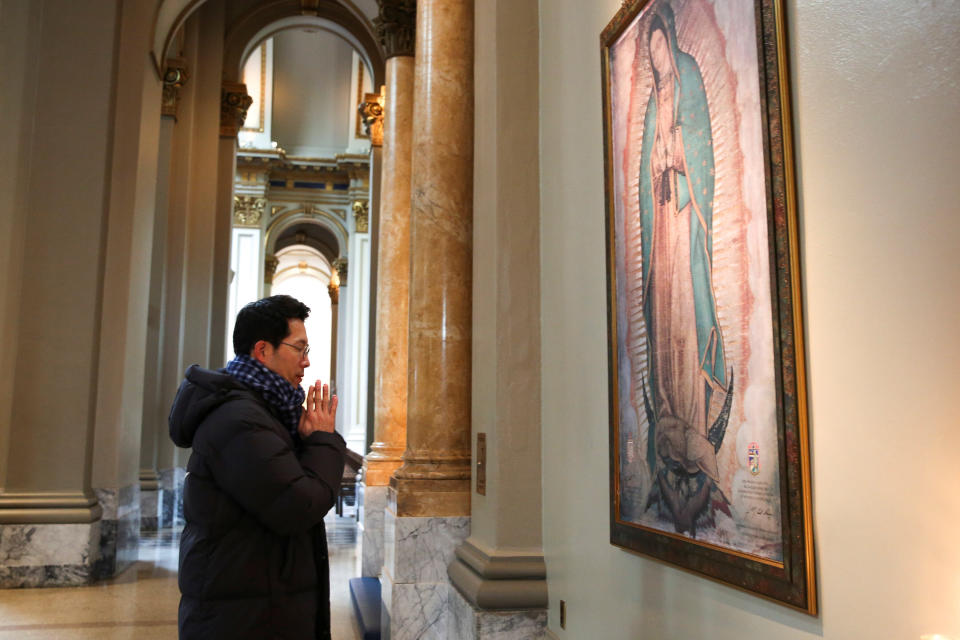
Catholic dioceses across the country have been issuing guidelines for parishes seeking to combat the spread of the coronavirus in their communities.
These directives affect key rituals, such as Holy Communion. Some bishops have temporarily banned the distribution of consecrated wine. Some are also encouraging priests and deacons to place the host — or sacramental bread — into congregants’ hands instead of directly into their mouths.
The guidelines have affected how parishioners interact with each other during Mass. For example, Catholics are being asked to refrain from holding hands during the Lord’s Prayer or greeting each other with a handshake, hug or kiss during the sign of peace.
Dioceses have also asked parishes to empty holy water fonts, which Catholics use to bless themselves as they enter church.
On Thursday, the Archdiocese of Chicago urged parishes to strongly consider postponing large events if many participants are over the age of 60. The archdiocese reminded parishioners that, per canon law, people who are sick or have underlying health conditions are not obligated to attend Mass. People over 60 years old can choose to use this dispensation given the circumstances, the archdiocese said.
In light of the cluster of cases in Seattle, Archbishop Paul Etienne announced that he was indefinitely suspending all public Masses.
Over in Portland, Oregon, Archbishop Alexander Sample had a different response. The governor announced a statewide prohibition on gatherings of more than 250 people, but Sample said in a statement that he would not cancel public Masses. Instead, he asked priests to think of “creative” solutions ― such as adding more services throughout the day and discouraging people over 60 and those who are sick from attending.
“The celebration of the Most Holy Eucharist is the source and summit of the Christian life,” Sample said. “For these reasons, the Church places a grave obligation for the faithful to participate at Mass on Sundays and Holy Days of Obligation.”
Protestant Churches
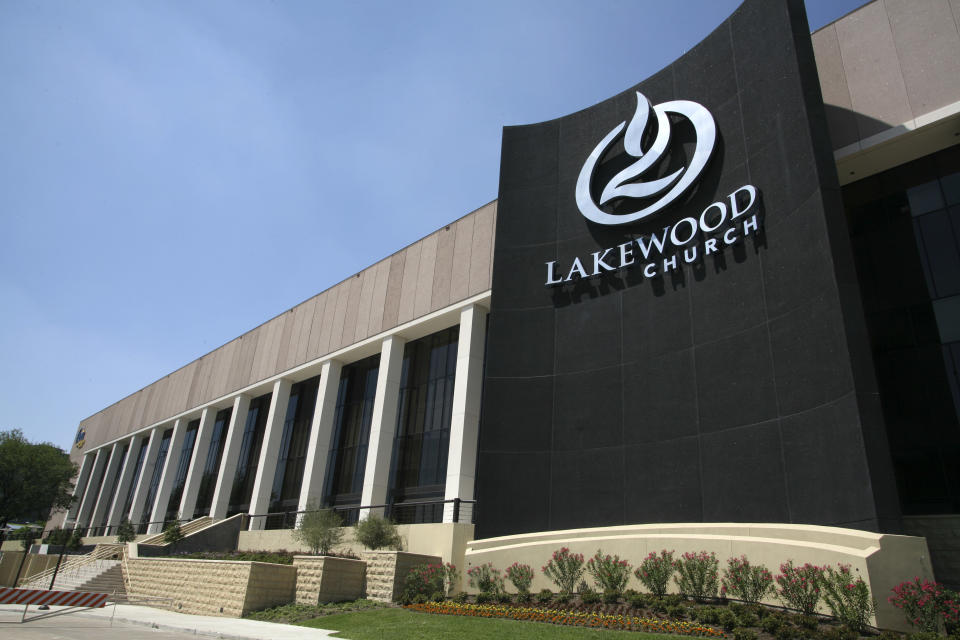
American Protestant churches had an array of reactions to the COVID-19 outbreak.
The executive committee of the Southern Baptist Convention, America’s largest Protestant denomination, has asked its more than 47,500 member churches to set aside a time of prayer on March 15 to pray for government leaders, for the denomination’s missionaries and for relief from the virus.
“Ask God, in His mercy, to stop this pandemic and save lives — not only in our communities but around the world, particularly in places that are unequipped medically to deal with the virus,” the leaders instructed Southern Baptists in a statement.
The SBC’s president, J.D. Greear, announced that he was canceling weekend worship gatherings at his own North Carolina congregation, The Summit Church.
Canceling this weekend's worship gatherings was a difficult decision, but we did so: (1) to honor our governing officials, who have urged extreme caution, and (2) to love our neighbors, many of whom are particularly vulnerable to COVID-19.https://t.co/7WEGRTdZCQ pic.twitter.com/Ut5oOI0lYB
— J.D. Greear (@jdgreear) March 12, 2020
Televangelist Joel Osteen’s Lakewood Church in Houston — which is considered to be the largest church in the U.S. and draws significant numbers of international visitors every week — has canceled public services for this weekend. The church announced on Facebook that it would “monitor the situation week by week” to gauge whether and when services could resume.
United Methodist churches in the Pacific Northwest have canceled large events and produced resources for churches seeking to move their worship services online.
Episcopal churches in Virginia, Maryland and Washington, D.C., have canceled services for two weeks at more than 250 churches, including the Washington National Cathedral, the country’s second-largest cathedral.
The cathedral’s dean, Rev. Randolph Marshall Hollerith, said Christians have a “moral, religious and civic obligation” to do whatever is necessary to help stop the pandemic.
“These are anxious and uneasy times. The tension is palpable, and everyone is desperate for certainty,” Hollerith said in a statement. “The one thing that we know for sure is that God’s love is stronger, deeper and more life-giving than anything else that comes our way.”
Keep up with the latest updates on the coronavirus at our live blog.
This article originally appeared on HuffPost.

